|
Books Should Be Free Loyal Books Free Public Domain Audiobooks & eBook Downloads |
|
|
Books Should Be Free Loyal Books Free Public Domain Audiobooks & eBook Downloads |
|
Poetry |
|---|
|
Book type:
Sort by:
View by:
|
By: Anonymous | |
|---|---|
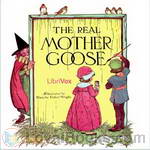 The Real Mother Goose
The Real Mother Goose
A heartwarming collection of nursery rhymes that will take you back to your childhood! | |
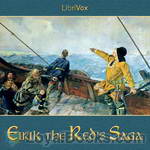 Eirik the Red's Saga
Eirik the Red's Saga
In this saga, the events that led to Eirik the Red’s banishment to Greenland are chronicled, as well as Leif Eirikson’s discovery of Vinland the Good (a place where wheat and grapes grew naturally), after his longboat was blown off-course. By geographical details, this place is surmised to be present-day Newfoundland, and is likely the first European discovery of the American mainland, some five centuries before Christopher Columbus’s journey. | |
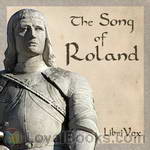 The Song of Roland
The Song of Roland
The Song of Roland is an epic poem, originally sung in Old French. It tells the story of the Battle of Roncevaux Pass in 778. This is an English translation. Translated by Charles Kenneth Scott-Moncrieff. | |
 The Anti-Slavery Alphabet
The Anti-Slavery Alphabet
| |
 The Ladies Delight
The Ladies Delight
| |
 Select Epigrams from the Greek Anthology
Select Epigrams from the Greek Anthology
| |
 The Three Bears
The Three Bears
| |
 The Mouse and the Christmas Cake
The Mouse and the Christmas Cake
| |
 King Winter
King Winter
| |
 Punky Dunk and the Gold Fish
Punky Dunk and the Gold Fish
| |
 The Death and Burial of Cock Robin
The Death and Burial of Cock Robin
| |
 The Wonders of a Toy Shop
The Wonders of a Toy Shop
| |
 The Tiny Picture Book
The Tiny Picture Book
| |
 Amusing Trial in which a Yankee Lawyer Renders a Just Verdict
Amusing Trial in which a Yankee Lawyer Renders a Just Verdict
| |
 The Courtship, Marriage, and Pic-Nic Dinner of Cock Robin & Jenny Wren With the Death and Burial of Poor Cock Robin
The Courtship, Marriage, and Pic-Nic Dinner of Cock Robin & Jenny Wren With the Death and Burial of Poor Cock Robin
| |
 Naughty Puppies
Naughty Puppies
| |
 The Fox and the Geese; and The Wonderful History of Henny-Penny
The Fox and the Geese; and The Wonderful History of Henny-Penny
| |
 Punky Dunk and the Mouse
Punky Dunk and the Mouse
| |
 Punky Dunk and the Spotted Pup
Punky Dunk and the Spotted Pup
| |
 Fairy's Album With Rhymes of Fairyland
Fairy's Album With Rhymes of Fairyland
| |
 The Assemble of Goddes
The Assemble of Goddes
| |
 The Interlude of Wealth and Health
The Interlude of Wealth and Health
| |
 The Entertaining History of Jobson & Nell
The Entertaining History of Jobson & Nell
| |
 The Ghost of Chatham; A Vision Dedicated to the House of Peers
The Ghost of Chatham; A Vision Dedicated to the House of Peers
| |
 Please Buy My Verses
Please Buy My Verses
volunteers bring you 10 recordings of Please Buy My Verses by Anonymous. This was the Weekly Poetry project for November 18, 2018. ------ PLEASE BUY MY VERSES. PRICE: WHAT YOU PLEASE The Bearer Lost His Eyesight While Blasting in December, 1868. - Summary by text | |
 Merry Christmas : two early birds
Merry Christmas : two early birds
volunteers bring you 11 recordings of A Merry Christmas : two early birds by anonymous. This was the Weekly Poetry project for December 11. 2018. ------ This Christmas pamphlet, dated 1890, from The Mail and Empire, a Toronto newspaper, solicits Christmas donations for the newspaper delivery boys. - Summary by David Lawrence | |
 Santa Claus, Kriss Kringle or St. NIcholas
Santa Claus, Kriss Kringle or St. NIcholas
volunteers bring you 14 recordings of Santa Claus, Kriss Kringle or St. NIcholas by Anomymous. This was the Fortnightly Poetry project for December 16, 2018. ------ This poem was published in booklet form with illustrations in 1897. - Summary by David Lawrence | |
By: Anthony Munday (1560? -1633) | |
|---|---|
 Sir Thomas More
Sir Thomas More
Sir Thomas More is a collaborative Elizabethan play by Anthony Munday and others depicting the life and death of Thomas More. It survives only in a single manuscript, now owned by the British Library. The manuscript is notable because three pages of it are considered to be in the hand of William Shakespeare and for the light it sheds on the collaborative nature of Elizabethan drama and the theatrical censorship of the era. The play dramatizes events in More's life, both real and legendary, in an episodic manner in 17 scenes, unified only by the rise and fall of More's fortunes. | |
By: Aristotle (384-322 BC) | |
|---|---|
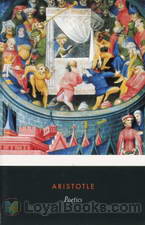 Poetics
Poetics
Aristotle’s Poetics from the 4th century B.C. aims to give a short study of storytelling. It discusses things like unity of plot, reversal of situation, and character in the context of Greek tragedy, comedy and epic poetry. But it still applies today. It is especially popular with screenwriters as seen in many script gurus’ how-to books. | |
By: Arthur Davison Ficke (1883-1945) | |
|---|---|
 Spectra A Book of Poetic Experiments
Spectra A Book of Poetic Experiments
| |
By: Arthur Hugh Clough (1819-1861) | |
|---|---|
 Amours De Voyage
Amours De Voyage
| |
 Say Not the Struggle Naught Availeth
Say Not the Struggle Naught Availeth
Arthur Hugh Clough (kluf) was an English poet, an educationalist, and the devoted assistant to ground-breaking nurse Florence Nightingale. He was the brother of suffragist Anne Clough, who became principal of Newnham College, Cambridge. | |
By: Arthur Macy (1842-1904) | |
|---|---|
 Mrs. Mulligatawny
Mrs. Mulligatawny
Arthur Macy was a Nantucket boy of Quaker extraction. His name alone is evidence of this, for it is safe to say that a Macy, wherever found in the United States, is descended from that sturdy old Quaker who was one of those who bought Nantucket from the Indians, paid them fairly for it, treated them with justice, and lived on friendly terms with them. In many ways Arthur Macy showed that he was a Nantucketer and, at least by descent, a Quaker. He often used phrases peculiar to our island in the sea, and was given, in conversation at least, to similes which smacked of salt water. Almost the last time I saw him he said, "I'm coming round soon for a good long gam." | |
 Easy Knowledge
Easy Knowledge
Arthur Macy did not consider his work of sufficiently high poetic standard to be published. Every one praised his choice of words, his wonderful facility in rhyme, the perfection of his metre, and the daintiness and delicacy of his verse. "All right," he would say, "but that is not Poetry with a big P, and that is the only kind that should be published. And there is mighty little of it." | |
 In Remembrance
In Remembrance
volunteers bring you 14 recordings of In Remembrance by Arthur Macy. This was the Fortnightly Poetry project for November 7, 2021. ------ A tribute to friends both past and present, this poem is taken from Poems by Arthur Macy - Summary by David Lawrence | |
 Five Senses
Five Senses
Arthur Macy was a Nantucket boy of Quaker extraction. His name alone is evidence of this, for it is safe to say that a Macy, wherever found in the United States, is descended from that sturdy old Quaker who was one of those who bought Nantucket from the Indians, paid them fairly for it, treated them with justice, and lived on friendly terms with them. In many ways Arthur Macy showed that he was a Nantucketer and, at least by descent, a Quaker. He often used phrases peculiar to our island in the sea, and was given, in conversation at least, to similes which smacked of salt water... | |
By: Arthur Symons (1865-1945) | |
|---|---|
 Rain On The Down
Rain On The Down
Our Valentine Poem is by Arthur William Symons, a British poet, critic and magazine editor., taken from his collection Silhouettes . - Summary by David Lawrence | |
By: Arthur Thomas Quiller-Couch (1863-1944) | |
|---|---|
 Bulchevy's Book of English Verse
Bulchevy's Book of English Verse
| |
 Green Bays. Verses and Parodies
Green Bays. Verses and Parodies
| |
By: Arthur Weir (1864-1902) | |
|---|---|
 Snowflake and Other Poems
Snowflake and Other Poems
This is a volume of Canadian poet Arthur Weir. Many of the poems are set around the turn of a year, referencing the season in different ways, and touching upon almost every emotion and association we might connect with winter. - Summary by Carolin | |
By: Augusta Webster (1837-1894) | |
|---|---|
 Mother and Daughter
Mother and Daughter
Uncompleted at her death, Augusta Webster's posthumously published sonnet sequence Mother and Daughter celebrates the relationship between a mother and her only child. As well as reflecting on aging and mortality, the sonnets express joy and love. This volume includes seven additional sonnets on other themes. | |
By: Beatrice Bradshaw Brown | |
|---|---|
 Paris Pair, Their Day's Doings
Paris Pair, Their Day's Doings
volunteers bring you 9 recordings of Paris Pair, Their Day's Doings by Beatrice Bradshaw Brown. This was the Fortnightly Poetry project for January 20, 2019. ------ A poetic summary of a day in the life of two children in Paris. | |
By: Ben Jonson (1572-1637) | |
|---|---|
 The Forest
The Forest
The Forest is a short collection of Ben Jonson’s poetry. This collection of fifteen poems first appeared in the 1616 first folio of his collected works. | |
By: Bertha Upton (1849-1912) | |
|---|---|
 The Adventure of Two Dutch Dolls and a 'Golliwogg'
The Adventure of Two Dutch Dolls and a 'Golliwogg'
| |
By: Bertram Stevens (1872-1922) | |
|---|---|
 An Anthology of Australian Verse
An Anthology of Australian Verse
| |
By: Bjørnstjerne Bjørnson (1832-1910) | |
|---|---|
 Mountain Song
Mountain Song
LibriVox volunteers bring you nine recordings of "Mountain Song” by Bjørnstjerne Bjørnson. The Weekly Poem for August 31, 2014 takes us up to the mountain heights of Norway. | |
By: Bliss Carman | |
|---|---|
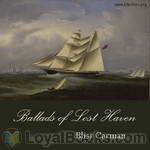 Ballads of Lost Haven: A Book of the Sea
Ballads of Lost Haven: A Book of the Sea
This collection of lyric poems evokes the sea in every line, from birth (A Son of the Sea) to death (Outbound). The smells, sights and sounds of the Canada's East Coast feature prominently. | |
 Nocturne: In Anjou
Nocturne: In Anjou
volunteers bring you 19 recordings of Nocturne: In Anjou by Bliss Carman and Richard Hovey. This was the Weekly Poetry project for November 10, 2019. ------ Richard Hovey collaborated with Canadian poet Bliss Carman on three volumes of "tramp" verse: Songs from Vagabondia , More Songs from Vagabondia , and Last Songs from Vagabondia , the last being published after Hovey's death. Hovey and Carman were members of the "Visionists" social circle along with F. Holland Day and Herbert Copeland, who published the "Vagabondia" series. - Summary by Wikipedia | |
 Hearse-Horse
Hearse-Horse
volunteers bring you 15 recordings of The Hearse-Horse by Bliss Carman. This was the Weekly Poetry project for October 28, 2018. ------- Bliss Carman, FRSC was a Canadian poet who lived most of his life in the United States, where he achieved international fame. He was acclaimed as Canada's poet laureate during his later years. Richard Hovey was an American poet.. He collaborated with Canadian poet Bliss Carman on three volumes of "tramp" verse: Songs from Vagabondia , More Songs from Vagabondia , and Last Songs from Vagabondia , the last being published after Hovey's death... | |
 By the Aurelian Wall and Other Elegies
By the Aurelian Wall and Other Elegies
This is a small volume of beautiful melancholy verses by Canadian poet Bliss Carman. The poems share a common theme which is the death of persons known and unknown to the poet. - Summary by Carolin | |
By: Bret Harte (1836-1902) | |
|---|---|
 What the Wolf Really Said to Little Red Riding Hood
What the Wolf Really Said to Little Red Riding Hood
Francis Bret Harte was an American author and poet, best remembered for his short fiction featuring miners, gamblers, and other romantic figures of the California Gold Rush. In a career spanning more than four decades, he wrote poetry, fiction, plays, lectures, book reviews, editorials, and magazine sketches in addition to fiction. As he moved from California to the eastern U.S. to Europe, he incorporated new subjects and characters into his stories, but his Gold Rush tales have been most often reprinted, adapted, and admired. | |
 Excelsior
Excelsior
| |
 Society Upon The Stanislaus
Society Upon The Stanislaus
volunteers bring you 12 recordings of The Society Upon The Stanislaus by Bret Harte. This was the Fortnightly Poetry project for January 24, 2021. ------ Taken from Little Masterpieces of American Wit and Humor, Volume II by Thomas L. Masson - Summary by David Lawrence | |
By: Brontë sisters | |
|---|---|
 Selected Poems by Currer, Ellis and Acton Bell
Selected Poems by Currer, Ellis and Acton Bell
Poems by Currer, Ellis and Acton Bell was a volume of poetry published jointly by the three Bronte sisters, Charlotte, Emily and Anne in 1846, and their first work to ever go in print. To evade contemporary prejudice against female writers, the Bronte sisters adopted androgynous first names. Marked by profound sentiments, gravity and melodious harmony, the poems are strewn on the fields of soulful love, rueful reminiscence and the immortal yearnings of a Christian soul, and represent a fragrant assemblage of noetic flowers from the glebes of olden England... | |
By: BS Murthy | |
|---|---|
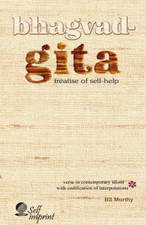 Bhagvad-Gita: Treatise of Self-help
Bhagvad-Gita: Treatise of Self-help
The spiritual ethos and the philosophical outlook that the Bhagvad - Gita postulates paves the way for the liberation of man, who, as Rousseau said, ‘being born free, is everywhere in chains’. But equally it is a mirror of human psychology, which enables man to discern his debilities for appropriate redressal. All the same, the boon of an oral tradition that kept it alive for over two millennia became its bane with the proliferation of interpolations therein. Besides muddying its pristine philosophy, these insertions affect the sequential conformity and structural economy of the grand discourse... | |
By: Burton Egbert Stevenson (1872-1962) | |
|---|---|
 The Home Book of Verse
The Home Book of Verse
| |
By: C. J. Dennis (1876-1938) | |
|---|---|
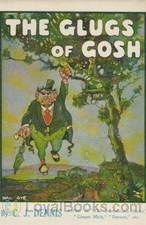 The Glugs of Gosh
The Glugs of Gosh
First published in 1917, The Glugs of Gosh satirizes Australian life at the start of the twentieth century – but the absurdities it catalogs seem just as prevalent at the start of the twenty-first. The foolishness of kings, the arrogance of the elite, the gullibility of crowds, the pride of the self-righteous, the unthinking following of tradition – all find themselves the targets of C. J. Dennis’ biting wit. | |
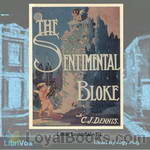 The Songs of a Sentimental Bloke
The Songs of a Sentimental Bloke
The Songs of a Sentimental Bloke is a verse novel by Australian novelist and poet C. J. Dennis. The book sold over 60,000 copies in nine editions within the first year, and is probably one of the highest selling verse novels ever published in Australia.The novel tells the story of Bill, a larrikin of the Little Lonsdale Street Push, who is introduced to a young woman by the name of Doreen. The book chronicles their courtship and marriage, detailing Bill’s transformation from a violence-prone gang member to a contented husband and father. C.J. Dennis went on to publish three sequels to this novel: The Moods of Ginger Mick (1916), Doreen (1917) and Rose of Spadgers (1924) | |
 Ruined Reversolet
Ruined Reversolet
LibriVox volunteers bring you 16 recordings of A Ruined Reversolet by C. J. Dennis. This was the Weekly Poetry project for October 28, 2012.Clarence James Dennis was an Australian poet and journalist. In his varied career, he worked as a barman, shearer, solicitor's clerk, newspaper proprietor and (as do many Australians) a civil servant, before settling down in a rural retreat at Toolangi, in the Dandenong Ranges, east of Melbourne.His most famous work is "The Songs of a Sentimental Bloke", a verse novel written in an Australian vernacular and first published in 1915... | |
 Australaise
Australaise
LibriVox volunteers bring you 6 recordings of The Austra--laise by C.J.Dennis. This was the Fortnightly Poetry project for January 13, 2013.THE AUSTRALAISE is a poem composed by C.J. Dennis, widely considered to the poet laureate of vernacular verse in Australia. It first appeared in his collection, Backblock Ballads and Other Verses, the first edition of which was published in 1913. A source from which Dennis drew inspiration was W.T. Goodge's poem The Great Australian Adjective, which first appeared in the Bulletin in 1898... | |